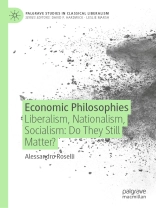The book shows the ideological underpinning of the economist’s work, and the ideological perspectives are those that have largely prevailed in the last couple of centuries: liberalism, nationalism and socialism. It is on the ground and strength of these ideologies that systems of political economy have been built. Roselli explores the connections between theory and value judgements to identify the philosophical premises behind the economic reasoning of economists as diverse as Smith, Ricardo, Marx, Pareto, Keynes, Hayek, among others.
The vicissitudes of economic nationalism, its statist and protectionist features, its decline and recent resurgence are examined, being unclear what shape it is currently taking from an economic and political viewpoint. This is particularly obscure in the case of that specific form of nationalism called populism.
The decline and fall of Marx’s historical materialism cannot hide the inherent contrast of interest between the two sides of a labour contract. The lasting legacy of socialism is the enduring and multiform relevance – from a cowed labour force to environmental issues – of social themes in modern economies.
表中的内容
Chapter One: Ideologies and Political Economy in the 19th Century.- Chapter Two: Metamorphoses of liberalism in the 20th century.- Chapter Three: Enemies of liberalism.- Chapter Four: Neoliberalism.- Chapter Five: As I See It.
关于作者
Alessandro Roselli is an Honorary Fellow at Cass Business School, University of London and Senior Fellow at Buckingham University, UK. He has been A.C. Jemolo Fellow at Nuffield College, University of Oxford, UK. Previously, he worked at the Bank of Italy for 40 years. He has written extensively on economic history and financial regulation. Roselli recently co-edited The Economics of Monetary Unions: Past Experience and the Eurozone.












